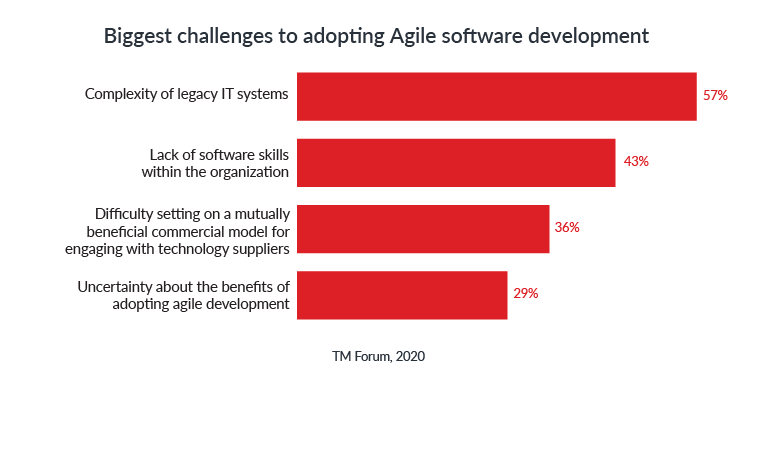Network and connectivity providers have known for some time that digital transformation is a top priority. All communications service providers (CSPs) know they have to change, and fast, says Mark Newman, chief analyst at TM Forum.
However, within the industry, many are trying to understand exactly what digital transformation looks like for their organisation. According to new research conducted by industry association, TM Forum, digital transformation starts with cultural transformation because new technologies cannot be adopted with an old mindset. As a result, changing how the industry views and embraces change requires a lot of work.
In its latest Digital Transformation Tracker 4, “The culture wars of transformation,” report, the Forum, compared CSP responses from a 2017 survey to those of today. While many CSPs are optimistic about the future of their business and their transformation journeys, survey results showed that very little progress has actually been made towards their transformation goals.
The past and present
So what is the current state of the industry today, and what obstacles do CSPs need to overcome to digitally and culturally transform?
In 2017, we asked CSP respondents to rank the barriers that were currently standing in their way of successful transformation. At the time, responses were varied but many said that a lack of management support (42%) and lack of clear aligned vision and goals (32%) were the top challenges hindering transformation. Today, this has changed, with cultural transformation now posing the second biggest challenge. The top challenge is the lack of clear aligned vision and goals.
But what does that really mean? How do you define culture? Nailing its definition presents a significant challenge for the legacy CSP. Today, it’s known widely as “the operator identity crisis” because if operators don’t know who they are, how can they reasonably decide what they want to become?
This confusion was evident in the survey. When asked which characteristics (both negative and positive) defined CSP culture, we found many contradicting views with respondents stating that their organisations were many things at once. For example, some stated their organisations are both agile and diverse, while also hierarchical and resistant to change. Worryingly, some of the positive attributes typically associated with cultural transformation, such as “collaborative” and “energetic,” are less used by CSPs today than they were in 2018.
New culture, new technology, new skills
But it is not all bad, and there are changes happening in some areas. For example, according to the survey results, CSP culture is changing thanks to the implementation of cross-functional teams. This is positive — cross-functional teams are a mix of business and technical members that come together to work collaboratively and in an agile way. This not only helps CSPs to leverage the ways of working that have made their competition so successful such as agile software development, but it also allows these teams to better understand the value that each are delivering to their organisation.
Implementing these agile ways of working is no easy feat, however, and the slow progress made in cultural transformation proves to also be a hindrance for CSPs wanting to adopt agile software development. According to the survey, there are two main challenges standing in the way. (See image.)

First is the burden of legacy IT systems, with 58% of respondents citing this as the biggest barrier for CSPs wanting to become agile. These monolithic systems are often difficult to upgrade and simply don’t meet the needs of CSPs today. Getting rid of them is a costly and lengthy exercise which can significantly hamper how quickly CSPs can adopt agile methodologies.
Second is the lack of software skills within CSP organisations, cited by 43% of respondents as a significant challenge to agile development. Interestingly, the availability of skills has also become an important obstacle to overall cultural transformation, with 32% citing it as a barrier in 2020, compared to just 17% in 2017. Skills — or lack thereof — is therefore a big problem for CSPs. Without the right skills, they simply won’t be able to implement the technologies they will rely on in the future.
Skills in demand
As we see a greater emphasis being placed on data, analytics, automation and cloud-nativity, so too will we see a greater demand for data scientists, and developers, and machine learning experts. Despite some progress being made around reskilling and retraining employees, CSPs still have some way to go and it’s important that they place the right investment in their people to ensure they can deliver and evolve their services, according to rapidly changing digital, technical and societal trends. This agility will be paramount in their overall transformation success.
Change takes time and while we may not see CSPs reap the rewards of their efforts immediately, it’s important that they make progress on their transformation journeys. Doing so will require them to be prepared to take risks and able to make bold decisions around how they perceive their organisations to be, and to evolve. They will need to change their mindset, and ultimately, they will need to change who they are at their very core.
It certainly won’t be easy and there’s a long road ahead, but it’s important that CSPs make the leap forward by investing in their people; by embracing new ways of working; and by having a clear vision and strategy. The result will be worth the headache.
The author is Mark Newman is chief analyst at TM Forum.
About the author
Mark Newman is chief analyst at TM Forum where he heads up the research and media function and is responsible for the Digital Transformation Tracker, the survey tracker for digital transformation of the telecom operator business. A large part of Mark’s work involves delivering presentations, strategy sessions and workshops to global audiences, helping them to plan for the changes in technology and disruptive new business models that will fundamentally transform their businesses.
Comment on this article below or via Twitter: @VanillaPlus OR @jcvplus






